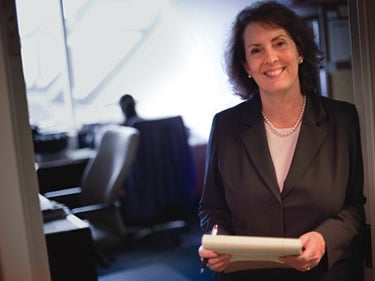To start a legal services organization, Jenny Brody ’81 asked for volunteers
“Do you have a law degree you’re not using?”
So began a January 2008 posting on Washington, D.C., listservs to attract lawyers for the DC Volunteer Lawyers Project, a nonprofit legal services organization begun by Jenny (Sternbach) Brody ’81. After 15 years at home with her three children, Brody re-entered the courtroom, this time taking pro bono cases in family law. She met Marla Spindel and Karen Barker Marcou, two attorneys who had followed a similar path after having children. Each had quickly discovered the logistical and financial challenges facing an individual doing pro bono work: expensive malpractice insurance, a lack of office space for meeting with clients and a lack of support. They knew there must be a better way.
“When we first started, we thought we would eventually have 10 attorneys and do 20 cases,” Brody said. Instead, 30 interested lawyers showed up to the first meeting, most of them mothers in a similar stage of life. They also found an untapped resource in laid-off associates eager to keep up their skills.
Soon, the organization had acquired a group malpractice policy, rented space in a shared office—which gave volunteers access to a business address for pleadings, conference rooms for client meetings and a telephone answering service—and established an online legal library. By the end of 2010, they had provided more than 14,000 hours of free legal services across 411 cases, primarily in the area of family law. They now have 430 volunteer lawyers.
Petitions for civil protection orders for domestic violence victims constitute the majority of the organization’s work. “The consequences of not being represented can literally be life and death,” Brody said about these clients. The need in this area is immense: DCVLP takes between two and four cases a week, but 20 victims come through the D.C. Superior Court intake center each day. “We have cases involving really horrific abuse—clients who have been stabbed, choked, or pummeled while pregnant and suffered a miscarriage,” Brody said. “It is actually inspirational to work with clients who have come to a point of wanting to stop the abuse, and to help them and their children create a new life.”
DCVLP lawyers also work extensively in guardian ad litem cases, immigration law cases and custody cases for prior domestic violence clients. Although Brody now takes on fewer cases herself and misses working with clients, she is intent on growing the organization. The nonprofit’s $250,000 annual budget is derived solely from private donors and grants. Brody hopes to increase it through more fundraising so that they can hire more part-time supervisory attorneys, which would allow volunteers to take on more cases. She and her co-founders would also love to help lawyers in other cities replicate their model.
For the clients of DCVLP, there is no doubt about the difference the organization has made in their lives. “Thank you for not handling my case with a cookie-cutter approach,” wrote a client in a successful protection order case. “I am grateful and thankful for this service for [domestic violence] victims.”
